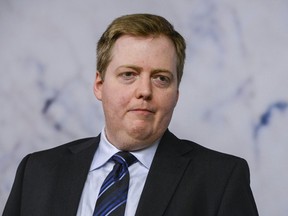Trudeau must clean up Canada's tax haven status

Article content
Politicians, dictators, warlords, CEOs, celebrities and garden-variety rich people don't pay taxes. Only dummies like me do. Aided and abetted by an army of lawyers, accountants, bankers and service providers like Mossack Fonseca, rich guys cache away trillions of dollars from the tax collectors.
Yes, as much as $32 trillion, according to one global estimate from 2012. That's double the U.S. debt for that year.
Among the many mysteries to me is that these white-collar avoiders and their helpers aren't treated like other bad guys. Because what's happening is that all these people are stealing from those of us still stupid enough to think that paying taxes is the price of citizenship.
Included in the Panama Papers list of individuals who set up shell companies in tax havens are: 140 politicians from 50 countries, including 12 current and former world leaders including Sigmundur David Gunnlaugsson, the former prime minister of Iceland; the king of Saudi Arabia; associates of both Syrian president Bashar al-Assad and Russian President Vladimir Putin; 29 billionaires from Forbes's list of the world's 500 richest; FIFA executives; soccer star Lionel Messi; movie star Jackie Chan and 350 Canadians.
By secreting away money, these leaders avoid paying money that should be going to fund health care, education and affordable housing. Statistics Canada has estimated that more than $170 billion is held by shell companies in offshore tax havens, with $60 billion in Barbados.
Yet we let them get away with avoiding taxes and when they're caught doing wrong, there's rarely the kind of shaming and disapprobation that comes with other crimes.
And while the latest scandal originated in Panama, don't for a minute think that tax haven and palm trees are necessarily synonymous. The top five havens on the Tax Justice Network's 2015 Financial Secrecy Index are: Switzerland, Hong Kong, the United States, Singapore and the Cayman Islands.
Canada ranks 29th of 102, sandwiched between Uruguay and Russia and is worse than countries once known for beaches and being tax havens -- U.S. Virgin islands, Belize, St. Vincent and the Grenadines, Antigua, Turks and Caicos, St. Kitts, Curaçao, Monaco, and Montserrat.
In the background paper on Canada, the Tax Justice Network says its role in the offshore system has three components. Since 1981, the Canadian government has "aggressively cut" corporate taxes from 38 per cent to 15 per cent and now has an "extremely low effective tax rate on businesses."
But Canada also has tax treaties with more than a dozen tax havens ranging from the Caribbean to Brunei to Liechtenstein.
These treaties allow companies to declare international income in jurisdictions where the taxes are close to zero and then, according to the Tax Justice Network, bring the money back to Canada as dividends without paying Canadian tax.
According to the International Monetary Fund, Canada has played "a significant part in the development of tax havens, notably in the Caribbean." Canadian banks make up about 60 per cent of all banks in the Caribbean.
According to the Tax Justice Network, Canada's other contribution to sheltering corporations and individuals from tax is that it is "effectively a regulatory haven for the world's extractive industries."
Perhaps unsurprisingly, Canada is home to three-quarters of the world's mining companies.
On Wednesday, Prime Minister Justin Trudeau called on the international community to work together to make global finance more transparent, but he also has work to do at home.